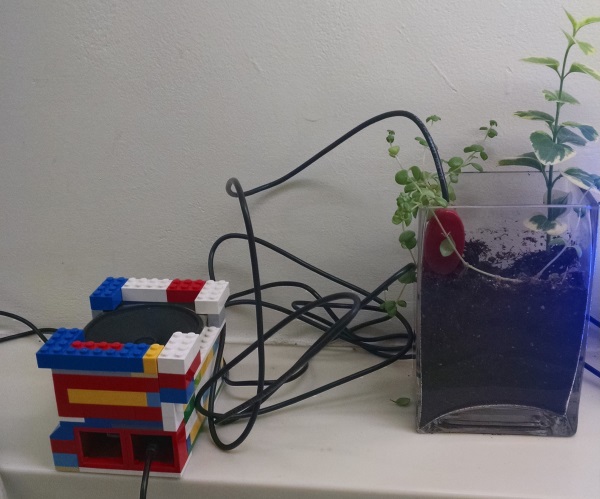Concluding the Thrilling Saga: The Talking Plant
As the third and final part of our interactive plant display at the Fairmount Water Works, our last plant is now able to talk. That is, it can express its need for water through audio. This setup uses an Arduino ($25), a Wave Shield ($22), and a Vegetronix VH400 soil moisture sensor ($37). Our two 10th grade Science Leadership Academy students had a lot of fun soldering and building the shield. To our delight (and surprise), it actually worked the first time we tried it.
The audio shield will only play .wav files. There are databases with huge amounts of them out there on the Internet. We faced some issues with our .wav files and their compatibility with the device, but after some practice, we began to get the hang of it.
Currently, in an attempt to annoy the Water Works employees (just kidding), each hour the plant takes a moisture reading. If the moisture level is satisfactory, it plays a clip of the song “Everything Is Awesome” from The Lego Movie, to go with the hardware’s awesome Lego case built by the SLA students:
If the moisture level is not satisfactory, it will play water droplet sounds, indicating it needs to be watered. There’s a lot of room for creativity here, because iTunes and Audacity can convert .mp3 to .wav files. What’s stopping Matt from recording himself, converting it, and uploading it to the Arduino? Nothing—he’s probably already started working on it.
View the code after the jump.
#include <FatReader.h>;
#include <SdReader.h>;
#include <avr/pgmspace.h>;
#include “WaveUtil.h”
#include “WaveHC.h”
SdReader card; // This object holds the information for the card
FatVolume vol; // This holds the information for the partition on the card
FatReader root; // This holds the information for the filesystem on the card
FatReader f; // This holds the information for the file we’re playing
WaveHC wave; // This is the only wave (audio) object, since we will only play one at a time
#define DEBOUNCE 100 // button debouncer
// this handy function will return the number of bytes currently free in RAM, great for debugging!
int freeRam(void)
{
extern int __bss_end;
extern int *__brkval;
int free_memory;
if((int)__brkval == 0) {
free_memory = ((int)&free_memory) – ((int)&__bss_end);
}
else {
free_memory = ((int)&free_memory) – ((int)__brkval);
}
return free_memory;
}
void sdErrorCheck(void)
{
if (!card.errorCode()) return;
putstring(“nrSD I/O error: “);
Serial.print(card.errorCode(), HEX);
putstring(“, “);
Serial.println(card.errorData(), HEX);
while(1);
}
void setup() {
// set up serial port
Serial.begin(9600);
putstring_nl(“WaveHC with 6 buttons”);
putstring(“Free RAM: “); // This can help with debugging, running out of RAM is bad
Serial.println(freeRam()); // if this is under 150 bytes it may spell trouble!
// Set the output pins for the DAC control. This pins are defined in the library
pinMode(2, OUTPUT);
pinMode(3, OUTPUT);
pinMode(4, OUTPUT);
pinMode(5, OUTPUT);
// pin13 LED
pinMode(13, OUTPUT);
// enable pull-up resistors on switch pins (analog inputs)
digitalWrite(14, HIGH);
digitalWrite(15, HIGH);
digitalWrite(16, HIGH);
digitalWrite(17, HIGH);
digitalWrite(18, HIGH);
digitalWrite(19, HIGH);
// if (!card.init(true)) { //play with 4 MHz spi if 8MHz isn’t working for you
if (!card.init()) { //play with 8 MHz spi (default faster!)
putstring_nl(“Card init. failed!”); // Something went wrong, lets print out why
sdErrorCheck();
while(1); // then ‘halt’ – do nothing!
}
// enable optimize read – some cards may timeout. Disable if you’re having problems
card.partialBlockRead(true);
// Now we will look for a FAT partition!
uint8_t part;
for (part = 0; part < 5; part++) { // we have up to 5 slots to look in
if (vol.init(card, part))
break; // we found one, lets bail
}
if (part == 5) { // if we ended up not finding one <img src=”http://diffusecreation.com/wp-includes/images/smilies/icon_sad.gif” alt=”:(” class=”wp-smiley”>
putstring_nl(“No valid FAT partition!”);
sdErrorCheck(); // Something went wrong, lets print out why
while(1); // then ‘halt’ – do nothing!
}
// Lets tell the user about what we found
putstring(“Using partition “);
Serial.print(part, DEC);
putstring(“, type is FAT”);
Serial.println(vol.fatType(),DEC); // FAT16 or FAT32?
// Try to open the root directory
if (!root.openRoot(vol)) {
putstring_nl(“Can’t open root dir!”); // Something went wrong,
while(1); // then ‘halt’ – do nothing!
}
// Whew! We got past the tough parts.
putstring_nl(“Ready!”);
}
void loop() {
//Test if it was received..
int sensorValue = 0;
sensorValue = analogRead(A0);
if (sensorValue < 200) {Serial.println(“boring”);
playcomplete(“drip.wav”);
Serial.println(sensorValue);
}
else{
Serial.println(sensorValue);
playcomplete(“awesome.wav”);
Serial.println(“GET DOWN!!!”);
//song();
}
for (int k=0; k < 60; k++) {
delay(60000); //1 hour delay
}
}
byte check_switches()
{
static byte previous[6];
static long time[6];
byte reading;
byte pressed;
byte index;
pressed = 0;
for (byte index = 0; index < 6; ++index) {
reading = digitalRead(14 + index);
if (reading == LOW && previous[index] == HIGH && millis() – time[index] > DEBOUNCE)
{
// switch pressed
time[index] = millis();
pressed = index + 1;
break;
}
previous[index] = reading;
}
// return switch number (1 – 6)
return (pressed);
}
// Plays a full file from beginning to end with no pause.
void playcomplete(char *name) {
// call our helper to find and play this name
playfile(name);
while (wave.isplaying) {
// do nothing while its playing
}
// now its done playing
}
void playfile(char *name) {
// see if the wave object is currently doing something
if (wave.isplaying) {// already playing something, so stop it!
wave.stop(); // stop it
}
// look in the root directory and open the file
if (!f.open(root, name)) {
putstring(“Couldn’t open file “); Serial.print(name); return;
}
// OK read the file and turn it into a wave object
if (!wave.create(f)) {
putstring_nl(“Not a valid WAV”); return;
}
// ok time to play! start playback
wave.play();
}

